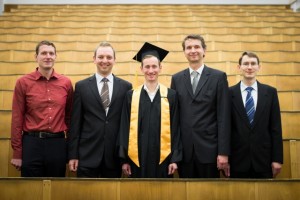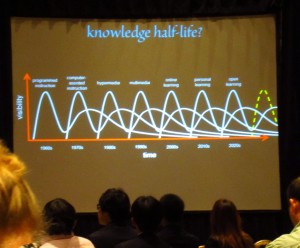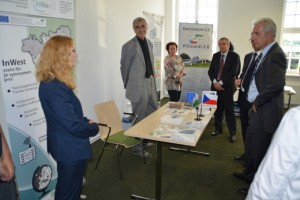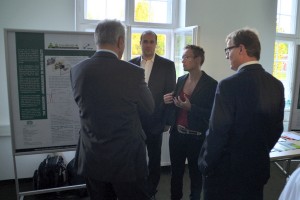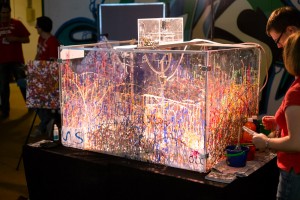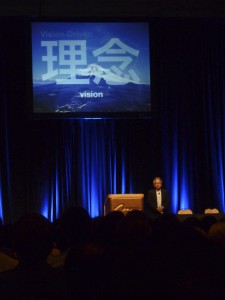Crossworlds associated PhD student Arne Berger successfully defended his PhD thesis
“Prototypes In Interaction Design” on Nov, 22nd, 2013. Arnes research focusses on prototypes as agents for reducing complexity at the intersection of design and computer science and reflecting players in interdisciplinary settings. His book is a must read for teams of mixed professions and will be available as Open Access (http://monarch.qucosa.de/startseite) very soon. Well done, Arne!
Organized by the Association for the Advancement of Computing in Education the 18th international E-Learn World Conference “E-Learn 2013” took place from October 21th – 24th in Las Vegas, Nevada, USA. The annual conference serves as a multi-disciplinary forum for the exchange of information on research, development, and applications of all topics related to e-Learning in the Corporate, Government, Healthcare, and Higher Education sectors. Kai-Uwe Martin of CrossWorlds’ Learning tandem presented his work
“Delivering complex learning content on mobile devices” as well as the general concept and idea of CrossWorlds. Highlights of the conference were the keynote by Roderick Sims of the University of Southern Queensland, Australia “The E-Learning Wars: The Force and the Dark Side!” and the first gathering of the special interest group “E-Learning Trends and Innovations (ELTI)”. During the conference and the workshops very controversial views on the current role of e-learning and of the emerge of trends like personal learning and open learning have been expressed and discussed which was possible thanks to the open atmosphere of the conference and certain degree of professionalism kept by all participants.
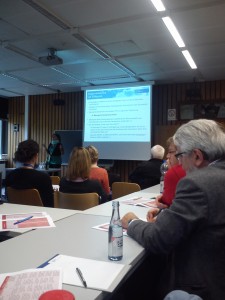 From September 23rd to 25th the German Psychological Society held its biannual symposium about pedagogical psychology. This year’s topic ‘gemeinsam verschieden’ (collectively different) inspired talks about the many different ways educational psychology is taught and experienced in the field of pedagogical psychology. The keynotes were presented by Prof. Dr. Marcus Hasselhorn (Frankfurt), Prof. Dr. Haci Halil Uslucan (Duisburg-Essen), Prof. Dr. Peter Farrell (Manchester) and Prof. Dr. Kathy Sylva (Oxford). Crossworld researcher Madlen Wuttke attended the symposium and gathered new input for her pedagogical agent scenario – for example the contribution by Roland Gabner (Neu(ro)-learning) as well as the findings of the panel on ‘Learning through text and images’ and ‘Optimized learning processes based on Eye-Tracking’.
From September 23rd to 25th the German Psychological Society held its biannual symposium about pedagogical psychology. This year’s topic ‘gemeinsam verschieden’ (collectively different) inspired talks about the many different ways educational psychology is taught and experienced in the field of pedagogical psychology. The keynotes were presented by Prof. Dr. Marcus Hasselhorn (Frankfurt), Prof. Dr. Haci Halil Uslucan (Duisburg-Essen), Prof. Dr. Peter Farrell (Manchester) and Prof. Dr. Kathy Sylva (Oxford). Crossworld researcher Madlen Wuttke attended the symposium and gathered new input for her pedagogical agent scenario – for example the contribution by Roland Gabner (Neu(ro)-learning) as well as the findings of the panel on ‘Learning through text and images’ and ‘Optimized learning processes based on Eye-Tracking’.
On September 5th the IBS Cooperation Day – “Business meets Science” took place at the IBS Foundation in Laubusch / Lusatia in Germany which was founded to improve the computer science collaboration in Saxony and across it’s country borders. The event chaired by Prof. Hardt of the Computer Engineering department in Chemnitz took place in a reworked coal production management building. Anke Tallig and Kai-Uwe Martin of our research training group presented the general concept of “CrossWorlds” and the project “Mediator – Ambassador in mixed reality” to an interested audience of scientific colleagues and representatives of companies and politics, most notably Saxony’s prime minister Stanislaw Tillich who showed a special interest in the interdisciplinary aspect.
Through conversation with other researchers, e. g. the robotics team of Prof. Böhme of Dresden University of Applied Sciences that works in areas like environment modeling, self-localization, and person perception and
various other scientists our different approaches to human machine interaction were analyzed. Chances and risks of the current technologies and future potential of our work were discussed and personal connections
established.
At this year’s INTERACT conference crossWorlds presented the publication ‘Diverse Ecologies – Interdisciplinary Development for Cultural Education’. Within their work crossWorlds researchers Heidt, Kanellopoulos, Pfeiffer and Rosenthal explore the implications of highly interdisciplinary research settings. Showing how differences between project participants can act as assets, they argue for a design process infused by multiperspectivity, disciplinary diversity and mutual sensitivity. The presentation at Cape Town, South Africa was met with a high amount of interest and sparked many engaging scientific discussions.
INTERACT’s motto ‘conference with a conscience’ also provided a helpful climate for articulation of ethical motivations underwriting design processes at crossWorlds. The conference thus provided a unique venue for discussion of ethical commitment as well as practical design. Hence, experiences made, positions exchanged and insights acquired have proven to contribute invaluably to ongoing research. Situated within multi-cultural Cape Town, INTERACT attracted participants from 37 countries, contributing to an atmosphere of diversity, curiosity and mutual tolerance.
This years edition of Germany’s primary conference on human computer interaction “Mensch und Computer” took place in bremen with high involvement of CrossWorlds’ researchers. Since the conference character emphasizes interdisciplinary exchange between academics, practioners, computer scientists, UX designers and social sientists several of our research fellows participated actively in the event.
Andreas Bischof and Benny Liebold organized a workshop on methodological approaches to HCI, where Kalja Kanellopoulos and Michael Storz presented their multitouch table for multiple users (Kanellopoulos, Storz 2013, in press). A very interesting discussion about the outlines of a possible mutual methodology for both computer scientists and designers / social scientists was initiated by Michael Heidt‘s talk (Heidt 2013, in press). The main talking points can be understood in two (german-language) blog posts. One is pointing out the question, how qualitative data and results can be communicated more compatible for HCI projects, the other sums up a discussion on interdisciplinary communication around code between computer scientists. A literally visionary (and entertaining) submission from TU Chemnitz researchers beyond that was the visual computing group‘s video on a possible HCI avatar tool in the shape of cuddly toys.Last week, CrossWorlds fellows Benny Liebold and Daniel Pietschmann went to Würzburg to present research papers with their respective working groups on “Emotionally Neutral Cues in Virtual Agent’s Expressive Behavior Impair Recognition of Emotions in Other Modalities” (Liebold) and “Effects of Video Game GUIs on the Construction of Rich Spatial Situation Models and Spatial Presence” (based on the Masters Thesis of and presented by Steve Nebel) at the 8th Conference of the Media Psychology Division of the German Psychological Society. Further talks included “Social Interaction in Massively Multiplayer Online Games: An Evolutionary Perspective” (Pietschmann), “No Evidence for Persuasion Effects of Emotional Advertisement on Attitudes towars Social Groups – The Case of Ageism” (Liebold) and “Gaze Path Analysis of Differences in Task Related Perception of Data Visualization” (Müller). Daniel also participated in the PhD Workshop the day before the conference.
We had a great time at the lab of Prof. Frank Schwab and colleagues in Würzburg and thank the organizers for putting together a great conference for the Media Psychology Division this year.
With the biannual conference on Affective Computing and Intelligent Interaction that aims at the intersection of research on human emotion and computational models of emotion, research on emotion both in humans and virtual entities found an important platform for interdisciplinary exchange. This year the 5th conference was held in Geneva, Switzerland, on September 2–5.
On Thursday, September 4, CrossWorlds fellow Benny Liebold gave a talk on “Multimodal emotion expression of virtual agents. Mimic and vocal emotion expressions and their effects on emotion recognition”. The talk addressed human recognition of emotion expressions of virtual agents. It was found that our ability to recognize emotional states from virtual agents is worse when virtual agents use unimodal expressions of emotions compared to multimodal expressions. Even more interestingly, unimodal expressions of emotions together with neutral nonverbal cues are recognized worse than isolated unimodal expressions of emotions. The latter might be a result of users perceiving the neutral expression of virtual agents as a relevant component of the virtual agent’s emotional state. Further results can be obtained from the conference proceedings, which are going to be indexed in IEEE Xplore.
A total number of 55 papers covered a vast area of research from psychological research in human emotions to computational models of emotional processes, such as empathy and automated emotion recognition. We thank the Computer Vision and Multimedia Laboratory and the Swiss Center of Affective Sciences from Geneva University, who did a great job in organizing the conference, putting together a great conference program including the very interesting keynote speakers.
This July the CrossWorlds fellows Anke Tallig, Michael Heidt and Michael Storz presented their paper submissions at the HCI International 2013 Conference in Las Vegas. With its two different thematic areas and nine affiliated conferences the conference had a very broad scope on many different aspects of human computer interaction. The large amount of submissions (1666 Papers and 303 Posters) gave attendees the opportunity to choose between many parallel sessions.
Anke Tallig presented on her work Border Crosser A Robot As Mediator Between Virtual and Real World, Michael Heidt his contribution Examining Interdisciplinary Prototyping in the Context of Cultural Communication and Michael Storz his work Annotate Train Evaluate. A Unified Tool for the Analysis and Visualization of Workflows in Machine Learning Applied to Object Detection and A Support Framework for Automated Video and Multimedia Workflows for Production and Archive for his college Robert Manthey.
During the workshop three members of the Crossworlds team presented their contributions in the field of computer engineering and E-Learning. In addition to these presentations of Anke Tallig, Kai-Uwe Martin and Madlen Wuttke from Technische Universität Chemnitz, the conference benefited greatly from contributions of researchers from Russia’s Novosibirsk State Technical University, Mongolia’s University of Science and Technology as well as researchers from India. Dr. Valerie Ruhe from Canada gave a keynote on ‚Evaluation in Distance Education and E-Learning: The Unfolding Model‘ which tied in very well with the Crossworld’s contributions ‚Mobile Learning‘, ‚Robotic Edutainers‘, and ‚Pro-Active Pedagogical Agents‘. All presented talks will be published in the upcoming conference proceedings, while the preparations for the International Summer Workshop in 2014 have already begun.
We thank the organizing committee, chaired by the IBS Foundation and the department of Computer Engineering by Prof. Dr. Hardt, for the enjoyable working environment and the opportunity to participate in the inspiring discussions.
